#aplatonic aro
Explore tagged Tumblr posts
Text
hi aro community. quick question
BE NORMAL ABOUT LOVELESS AND APLATONIC PEOPLE OR DIE BY MY BLADE
#loveless#loveless aromantic#loveless aro#aplatonic#aplatonic spectrum#aplatonic aro#BTW! You don’t have to be aro to be these. Sorry not sorry
296 notes
·
View notes
Text
Are you tired of being told how you, as an arospec, can still celebrate Valentine's Day? Same! Tired of being told you, an aplspec aro, are being a downer for not participating? Same!
Come celebrate World Bonobo Day with me! You may have been told that World Bonobo Day is on February 14th, but what is a bonobo?
A bonobo, also called the pygmy chimpanzee, is an endangered great ape and one of our closest relatives. They are similar to chimps in all but size, and are incredibly sensitive to change around their environment. Bonobos rarely breed, and rarely carry to term, which is worsened by stress from illegal bushmeat trapping breaking up troops. They are only native to the Democratic Republic of Congo's rainforest.
So, now we know what a bonobo is. But how do we support this endangered species?
1. Donate to initiatives supporting bonobos, like Lola Ya Bonobo Sanctuary!
Lola Ya Bonobo is a DRC sanctuary that raises and releases orphaned bonobos onto nature reserve, where they can be monitored while still living with their kind in the wild. They accept donations through Friends of Bonobos, which takes donations in various currencies through their website. You can also donate to local accredited zoos that raise bonobos to fund their care!
2. Donate to Congolese relief efforts!
Bushmeat only exists as a major source of food due to desperation. Extreme poverty caused by displacement, war, and labour exploitation drives people to rely more on bushmeat as an alternative. To reduce bushmeat reliance, you must help people get access to other methods. You can donate to SOS Congo, Friends of the Congo, Focus Congo, and UNHCR to support Congolese refugees and victims of violence.
No money to give? No problem! You can celebrate World Bonobo Day by spreading the word, lending your vocal support, and starting your own fundraising efforts! Seek out and collect donations for a Gofundme campaign! Promote your local zoos!
Want to join me in celebrating?
#aromantic#aro#arospec#aplatonic#aplspec#apl#aplaro#aroapl#aro apl#apl aro#aplatonic aro#aspec#scowl corner
64 notes
·
View notes
Text
"there's no platonic explanation of this!" "there's no romantic explanation of this!" THIS UNIVERSE HAS MAGIC AND DRAGONS AND SHIT WHAT MAKES YOU THINK ANYTHING NEEDS EXPLANATION
30 notes
·
View notes
Text
It’s Pride!
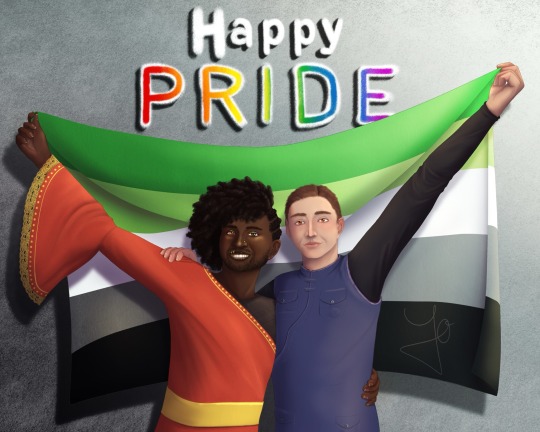
(ID in alt)
Happy pride to all aros, especially AroAllos, non-SAM Aros and other non-ace Aros, loveless and heartless Aros, disabled Aros, aplatonic Aros (also non-aro aplatonics, but this post is about my fellow aros :)) and all other Aros who are regularly forgotten and erased by the rest of the community!
Happy Pride Month!
#Pride Month#pride#queer#aromantic#aro#aro pride#aromanticism#AroAllo#AlloAro#heartless aro#loveless aro#heartless#loveless#aplatonic aro#aplaro#a dragon's blood / a serpent's wish#adb/asw#digital art#artists of tumblr
17 notes
·
View notes
Text
Aromantics follow differing roads to loveless identity. Many, after hearing “love” too often mean only “romantic love”, decide their aromanticism can’t or shouldn’t encompass it. Aplatonic aros may find lovelessness through enduring the aromantic community’s emphasis on desiring platonic love and relationships (often expressed as an alternative for or even improvement on romantic love and relationships). Some loveless aros celebrate their own love while rejecting the belief that ability to love designates goodness. Some of us know that we don’t or can’t love; some of us haven’t the least idea if we do! In experiences of attraction, a desire for partners/family, and personal relationships towards sex, romance and friendship, we are as wonderfully diverse as any other group of aros.
— love and attraction: yet another shape of allo-aro antagonism written by k. a. cook (follow @aroworlds)
#aromantic#aromantic awareness week#loveless aro#hearless aro#aromantic allosexual#alloaro#split attraction model#arophobia#alloarophobia#aplatonic aro#amatonormativity#amatopunk#fountain pen#words words words#no threads no ties
19 notes
·
View notes
Text
Do not be arophobic. Lest you want me to paint everything in your house green.
fun fact! you're arophobic of you don't support:
- cisgender aros
- xenogender aros
- hetero aros
- mspec aroaces
- loveless aros
- aplatonic aros
- heartless aros
- married aros
- non-sam aros
- aros with neopronouns
- neurodivergent aros
- physically disabled aros
- aros in romantic relationships
- aros in sexual relationships
ty for coming to my ted talk <3
#aro#aromantic#aromantism#arospec#aro pride#actually aromantic#actually arospec#aromanticism#loveless aro#aplatonic aro#aplatonic aroace#heartless#heartless aro#actually aroallo#actually aroace#loveless
1K notes
·
View notes
Text
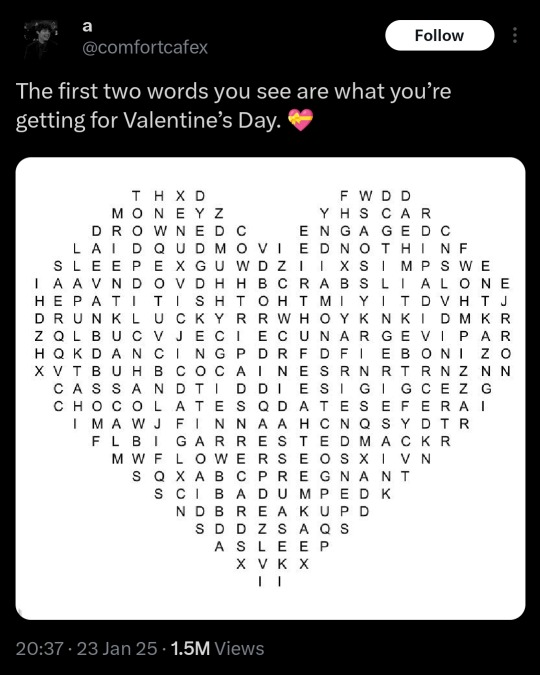
Guess what I saw:
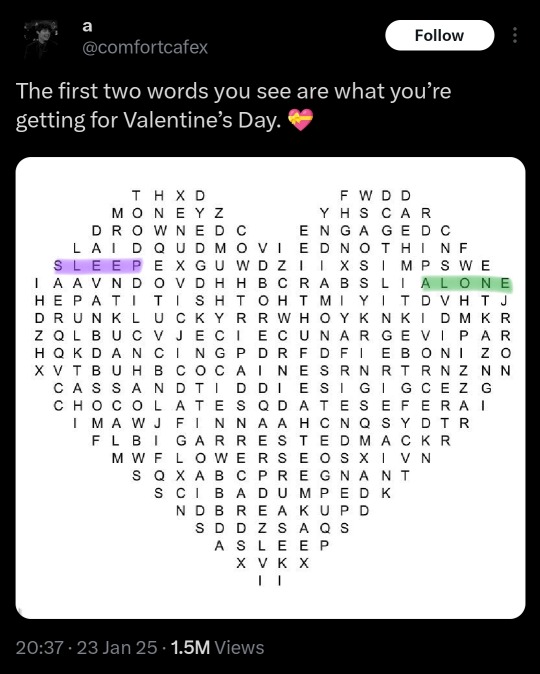
SLEEP, ALONE
SLEEP.
ALONE.
SLEEP ALONE 🗣️🗣️🔥🔥‼️‼️
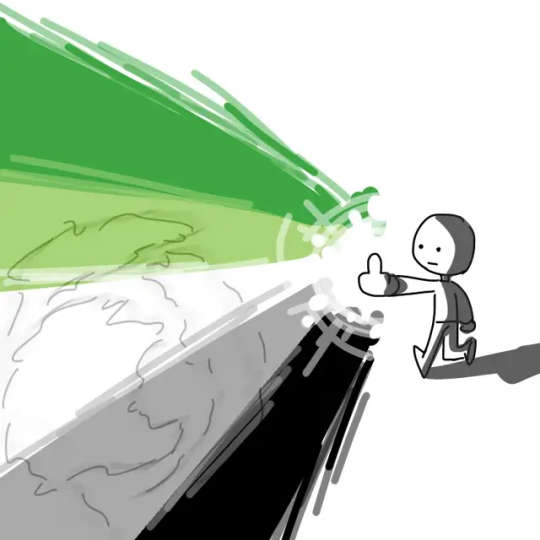
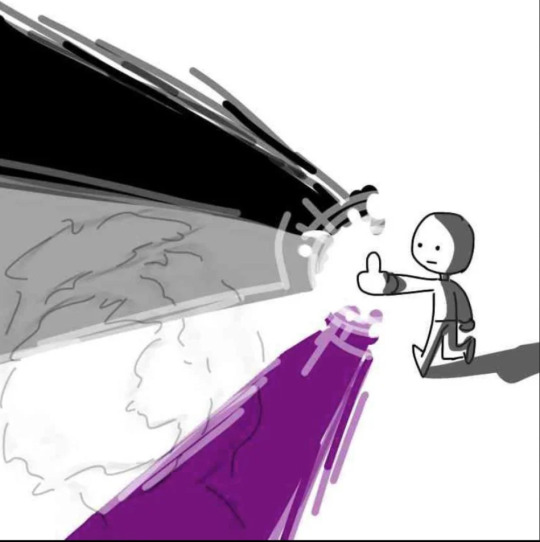
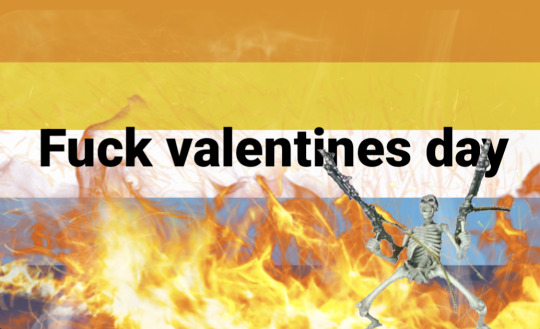
#aromantic#aro#aromantism#arospec#asexual#ace#asexuality#acespec#aroace#aplatonic#apl#aspec#saw this on twitter lmaooo#bro i hope this at least gets some reach ☠️#lemme know if i should add more tags#anyways fuck valentines day#also did you notice that hepatitis is one of the words ☠️#the unlucky people who saw “dies”:#[kal] posts
5K notes
·
View notes
Text
not having sex is morally neutral. having sex is morally neutral
not engaging in romance is morally neutral. engaging in romance is morally neutral
not having friends is morally neutral. having friends is morally neutral
5K notes
·
View notes
Text
SAY IT WITH ME GUYS, GALS, AND ENBY PALS OF TUMBLR
ASPEC PEOPLE ARE REAL AND VALID HUMAN BEINGS
ASPEC PEOPLE ARE REAL AND VALID HUMAN BEINGS
ASPEC PEOPLE ARE REAL AND VALID HUMAN BEINGS
ASPEC PEOPLE ARE REAL AND VALID HUMAN BEINGS
ASPEC PEOPLE ARE REAL AND VALID HUMAN BEINGS
ASPEC PEOPLE ARE REAL AND VALID HUMAN BEINGS
ASPEC PEOPLE ARE REAL AND VALID HUMAN BEINGS
ASPEC PEOPLE ARE REAL AND VALID HUMAN BEINGS
ASPEC PEOPLE ARE REAL AND VALID HUMAN BEINGS
ASPEC PEOPLE ARE REAL AND VALID HUMAN BEINGS
ASPEC PEOPLE ARE REAL AND VALID HUMAN BEINGS
ASPEC PEOPLE ARE REAL AND VALID HUMAN BEINGS
ASPEC PEOPLE ARE REAL AND VALID HUMAN BEINGS
ASPEC PEOPLE ARE REAL AND VALID HUMAN BEINGS
#lgbtq#lgbtqia#lgbtq community#aspec#asexual#aromantic#aroace#aplatonic#demisexual#demiromantic#graysexual#grayromantic#apothisexual#apothiromantic#acespec#arospec#aro pride#aromantism#aromanticism#asexuality
7K notes
·
View notes
Text
people who exclude straight trans people and straight aspec people are my worst enemies. btw
#trans#ace#aro#apl#transgender#asexual#aromantic#aplatonic#im not straight but guys do you not realise how important they are#I love you straight trans people I love you straight aspec people
11K notes
·
View notes
Text

11K notes
·
View notes
Text
Guys, it happened. I’m an
AAAAAA (aromantic, asexual, agender, with autism, adhd, & anxiety)
#asexual#autism spectrum#aromanticism#anxitey#agender#lgbt pride#neurodiversity#Idk if I’m aplatonic tho because I still want at least 1 friend but now I feel like I MUST be aplatonic so I can be a full set😭#asexuality#neurodivergent#neurospicy#neurodiverse stuff#lgbtqia#lgbtq community#lgbtq#queer#pride#asexuel#aroace spectrum#aro#aromantic#aroace#arospec#aromantism#aro pride#aspec#acespec#ace pride#ace#genderqueer
6K notes
·
View notes
Text
Loveless: A Loveless Review
[Plain Text: Loveless: A Loveless Review]
Trigger Warnings For: Discussion of sex, sex negativity, platonormativity, arophobic tropes, and anti-loveless rhetoric
Disclaimer/Disclosure: I couldn’t finish this book. This will factor heavily into the review, as it has to do with how some scenes, details, and the writing quality were just very hard to sit with and continue. I got about 50% through, so I didn’t just skim pages and get back to you on it.
You might guess I don’t think of this book highly if I had to put it down and stop reading. This would be correct. However, I have more in depth thoughts than that. If you like this book and don’t want to read negative things about it, that's fine, but I implore you to read it anyway. A lot of the problems in this book are present in a lot of creations I see and can be a valuable teaching lesson; loveless people aren’t out to ruin your fun because biases got questioned.
Alright. Enough disclaimers. Review under the cut.
The Bingo Card: Surprisingly, Not A Strikeout
People who have been following me for a while may remember I mentioned I went into reading this book with a bingo card in hand: Loveless and Tired Bingo, a sheet made by yours truly. I did not get Bingo with this book! I did, however, fill 17 spaces out of 25; it just didn’t happen to line up, not because the book passed with flying colors. We’ll return to the Bingo Card at the end of this post to see what it looked like. But, letting you know, that’s a rate of 68% of all squares ticked on Loveless and Tired Bingo. Not looking so hot.
Let’s start with the meat of the post so nobody has to read it all if they just wanted my representation opinions. Other things like writing will be shuffled down for your convenience.
Edit: Past Scowl is a liar and a fraud and did not have maims glasses on, and misread the bingo card! I did get Bingo. Oops. Point still stands because the data is the same, I just gave this book a sliver more credit than it deserved for not getting one.
Platonormativity, Envy, and The Loneliness Whirlpool
If this book had a full course meal, normativity would ironically be a key ingredient in every plate on the menu. Loveless has a platonormativity problem that confronts you from page 1, more realistically before that; the blurb!

[Text ID: From the marvelous author of Heartstopper comes an exceptional YA novel about discovering that it's okay if you don't have sexual or romantic feelings for anyone... since there are plenty of other ways to find love and connection. /End ID]
I promise not all my complaints will be raving about one sentence, but this kinda encapsulates the entirety of my problem with Loveless: Georgia Warr is not supported in her own novel. Loveless is a deeply insecure book that many can relate to, but, really… does it alleviate that insecurity, or just cover it up? There’s an unspoken “but” to every part of Loveless’ philosophy about aspec people [especially aroaces], where they must have platonic love to make them whole, to “fix” and “redeem” their lacking attractions. This has always bothered me, and it’s not an uncommon opinion in the community, unfortunately.
Aroaces aren’t allowed to simply “be” – they must be more. They must be so platonically invested you forget they’re aroace, because they have all this other type of love to give the world. It’s reflective of a view on a community sourced from hurt and exclusion, of someone trying to rebuild their worth on a new forefront. It doesn’t make it less of what it is, though: it’s a “yes they’re valid, but” statement that serves as the backbone for far too many aspec-focused media.
Georgia is a deeply unsure character, and there’s nothing wrong with her being this way; she’s a fictional character made to represent a journey of acceptance, not a real person with the ability to inflict harm on other real people. She does reflect the author’s biases in many ways and many points on the same token, though, acting as a mouthpiece. This often comes in Georgia’s insistence her friendships are simply stronger than other relationship types, as well as her reflexive tendencies to judge the friendless.
One of my many, many hurdles in this book had to do with Rooney [someone save her and half the cast from this novel, please], when the group realizes she’s only a socialite, not really a long-term relationship holder, and the entire room devolves into silent judgment. Georgia does not defend her newfound friend, simply noting she thought differently of her. What about Rooney not having many friends changes her outgoing personality? It doesn’t. It’s simply the fact that Rooney being friendless makes her weird, as with many things Rooney is unfairly demonized for in this novel.
The emphasis on friends doesn’t end here, and persists through the entire novel, practically. It is the main focus, when it isn’t talking about Georgia’s disinterests, and her friend circle is very important to her. All of this is fine. What isn’t fine is the expectation and casual enforcement of friendship being all you have, so you must seize it; this book, even though I wouldn’t recommend it, is often given as The Book on being aroace, but I wouldn’t agree [you’re free to tell me I can’t have an opinion on that if I’m not aroace, but at least read on before deciding anything, alright, official hear me out warning]. One, not all aroaces are alloplatonic, and two, this:
Why Is This Book Written Like A Workplace Safety Seminar
It’s a very… cookie-cutter way to be aroace, and cookie cutter aroaces exist in real life! The rep should exist, no doubt, and shouldn’t be taken away from anyone. It’s not my problem per se that the book is semi-stereotypical. What my problem is has to do with something I see a lot.
The book falls into many of the pitfalls of what I’m dubbing “the pamphlet effect”: when a novel, show, etc. continuously needs to halt the plot to remind the audience this character is different, and explains this to you in a way that resembles an educational pamphlet at a pride event. Georgia Warr feels like an example given to explain a concept more than a person, and I feel bad for her because of how little this book engages with her actual character when it shines through. I understand the book is primarily centered on her journey through the spectrum, but very little is given to make Georgia’s experience unique outside of one scene off the top of my head. Her interests, hobbies, and unique feelings only seem to play a role when it comes time to be an author mouthpiece on slutshaming for fun and sport; only one scene, the forced kiss with Jason when rehearsing the play, really blends her life experiences with her aroace experiences.
Georgia feels designed to be an everywoman, and it was very disappointing to say the least. Very little of the book actually feels like I’m with her, or learning about her unique take on being aroace as a theatre fan or young adult figuring things out; it just feels like Georgia [and the reader] are being dragged through the Cliff’s Notes version of what it is to discover being aroace, rather than a look at how a character like this might feel differently than others on a fuller, whole scale. She’s a hole that can fit most shapes into it, which makes her broadly relatable, but not as fun or engaging to read about if you don’t fit precisely in the demographic Georgia is for; even if you do, is there much to engage with beyond “I’m like that too!”?
This isn’t just a Georgia problem, either, as many, many characters in this book are walking stereotypes or very flat. But, we’ll get into that later [if you want to get into it now, skip to Writing Problems, Oh My!].
The Fingering In The Room: Loveless’ Weird Ideas About Sex
Alright, if you’re sex repulsed and braved the storm to get some insight, this next paragraph is just complete confusion about this book’s sex scenes and talking about some of the details within. If you want to skip that, skip the next paragraph.
Why is everybody fingering each other? Fingering is fine and it feels good, but it is basically the only sexual act this book knows outside of making out with tongue. Someone having sex in Loveless? They better have clipped their nails because at least two are going in. It feels like a point of research that was skipped because it was unimportant, which. Pretty much, yes. But when you’re someone who pays very close attention to sex scenes because you’re of the opinion they can have artistic value, as well as conveying the author’s views on sexuality, I come away with “is fingering what Oseman thinks young adults do?”. Anyways. Something I noticed.
[Okay sex repulsed people, you’re good. No in depth descriptions beyond this point, just the word “sex”.]
I should’ve titled this section “In Defense of Rooney Bach” because oh this poor girl. Oh you are just there to be gawked at.
First off, let’s begin in a good place: this book always has to clarify it isn’t slutshaming its characters, followed by slutshaming its characters. Rooney is, for the uninitiated, very sexually active. Georgia’s envy often leads to a judgemental, close minded view of Rooney that often pins her sex life as “too much” – something many sexually active women get villainized for. It strikes me immediately how Rooney is constantly picked on for her sexuality as a woman in ways no male characters who aren’t asexual either are treated. None of the men she flirts with or spends time with are reprimanded or “held to account” by the book; Rooney alone is breaking the rules. Rooney’s descriptions are often bookended with a disclaimer that she isn’t being called a slut, she’s just like one, which… This is slutshaming. You can’t just say you aren’t doing it to not be doing it.
Rooney is also a victim of a very arophobic trope, and one that is also misogynistic: the Broken Woman. Why is Rooney sexually active? A rough breakup that broke her heart and makes her fear intimacy on account of potentially being wrong again. Sure, sex feels good, but explicit focus is made on the fact she is only not engaging with romance because she tried and it didn’t work. For a few chapters, admittedly I was hoping for a book where an aroace and aroallo can get past some differences and expand each other's worldviews; what I got was Georgia thinking pretty poorly of Rooney through unaddressed envy and sex negativity, and Rooney being made to only like hookups because she’s messed up. Because of course a woman could only enjoy that if she had a negative experience that forced her on the path!
Also, another scene I didn’t like was Georgia and Pip watching Rooney have sex while she is completely unaware of their presence? Jason leaves as soon as he notices, but the two of them watch before Pip makes a comment on how disgusting it is and Georgia agrees. I’m shocked at how little this is brought up as being violating or creepy.
If it was a better book, I would have expected it to result in some kind of furthered conversation about boundaries; it could've been a place for Georgia to start establishing what she likes and dislikes, starting with Rooney preferably keeping her out of her sex life when she’s able. Instead, this event gets brought up solely for jokes, and for a motivation for Pip to start hating Rooney, despite her insistence it wasn't because of the hookup and she isn’t slutshaming. Always a great sign when that needs to be clarified. This is a PSA for everyone: you should not need to clarify you aren’t trying to slutshame. If you feel the need to do so, you are probably being sex negative.
This book isn’t very fond of sexually active people, nor is it kind to characters that are. I can understand why being asexual and sex repulsed is representation people would want, but I also think there’s many, many ways to write it without making it an exercise in shame.
Ironically Kinda Arophobic In Some Parts
This is a short section of a thing I noticed, hated, and had as a contributing factor for my ending early: this book loves aphobic tropes. There’s already the trope against aroallos of not needing romance because of being broken into only liking sex, but also the problem with Pip and Rooney.
I’m a lesbian, for clarification, and I’m saying from experience that I hate the archetype of the angry, jealous lesbian. It’s everywhere. It’s in this book. Pip, upon even the idea of being rejected, starts berating and demeaning the girl who turned her down, even if she was only turned down in her head. The book passes it off as a lighthearted, funny story that Pip got so mad at an ex-crush she was suspended for throwing an apple at their head. Why do I bring this up?
Is it not ringing any bells that this is arophobic? That a character so hostile to romantic rejection is treated as a joke? Many, many aros, and queer people in general, have experienced violence for turning down someone. It’s a serious issue for aros and a real fear in rejecting someone. I found it incredibly hard to read and sit through as everybody passes off Pip’s tendencies to do this to the women that reject her as a silly, funny Pip moment and not a major issue for the aspec community. I don’t care if it’s enemies to lovers, because it doesn’t really feel good to read at all. The only tension is built off the back of something I’ve experienced in real life and many others have as well.
Lovelessness: The Insecurity Unaddressed
This book, despite its title, is obviously about a loving character. Many people might not see this as a problem: first off, loveless doesn’t always mean the same thing, and second, many aroaces express feeling loveless when coming to terms with their identity. Here’s my rebuttal.
One: Georgia fits no definitions of the label. She subscribes to none of the beliefs. She loves her friends actively and sees their relationship as more than romance or sex, as something greater to her.
Second, this is because anti-loveless rhetoric is everywhere and all over this book. Not once is it suggested Georgia could live as loveless, or truly be without love. In the end, she is surrounded by it, simply learning to accept friendship instead. The way her insecurity isn’t met with “you’re complete as you are”, and instead with “you can still be complete if you simply fill the void with friends”, is anti-loveless. Nobody is allowed to be whole on their own without a subplot where their doubts are reinforced or they’re explicitly made to be broken inside.
This is shockingly common, and always sad every time I see it. Many aspects fear being loveless, as if it is a curse or blight they must cleanse. This book is one example out of many, but it doesn’t make it less hurtful when a book that runs against everything your community stands for [self-acceptance and the optionality of love] bears your name regardless. It is a book for people who are afraid of loneliness, and it answers their insecurities with “you’re right. You do need other people. You just need to find a way to still find and have a life partner!”. This is damaging to loveless people, especially those questioning an aplatonic identity.
Again, it’s not unique to Loveless. But, it’s reflective of a broader issue of aplatonics who may be seeking community constantly being presented with “you ARE broken, but friendship can fix you!”, a “solution” many can’t use, and often leads to even more self-hatred.
That’s about it from the aspec side of things. If you got this far, congrats! The rest is opinions on the writing, and the bingo card finale. You can drop off here if that’s all you came for.
Writing Problems, Oh My!
This is veering into heavy personal opinion, so, I will remind you: I don’t usually like YA, but YA can be a very good genre! I do not think this book is a good representation of what good YA looks like.
The writing quality is one of the hardest things to get past, because of a major problem I observed: Oseman is better at comics. This isn’t so much a vilification as a recommendation that it would’ve been much better suited for a different type of media. This kind of “media dysphoria” is present in many of the ways the book operates: many scenes would flow perfectly well in a visual piece. Georgia’s inner monologue has a tendency to jump suddenly into scenes and interrupt the action in a way that would be perfectly natural as a narration bubble put over a drawing of the scene around her. There are entire pages of just… text messages that would be much better suited to a visual medium where you could make these dialogue bits look much more interesting through different shots, or drawing what the background would look like on a screen [The Girl from the Sea does this well, for example].
There’s also the fact I cannot place in my mind if I'm too old for this novel. A lot of the jokes boil down to “hah! Sex!” in a way that instantly alienates me from the writing. The jokes can be pretty juvenile and repetitive, and serve to be the equivalent of a comedian saying “eh? Get it? That was a joke.” six times.
This isn’t to mention the fact many of these characters are complete cardboard. Sorry. Jason does not need to exist. When he appears in a scene, he is ignored or completely leaves it on his own. He really only serves to drive Georgia’s character forward, rather than have one of his own. I found myself forgetting he was present in a scene at all until he spoke again and reminded me of his existence. The book would practically be unchanged if Georgia temporarily dated Pip and Jason was never a factor, plus or minus the Shakespeare Soc plot.
Many interesting characters suffer from severe Pamphlet Effect syndrome. Most of the girls do. In a better novel, they would be more in depth, but Loveless doesn’t really afford them this luxury. I need to take the girls very far away from this novel, okay. I need someone to write a version of Loveless where they have personalities. There’s crumbs there. Please, someone make a loaf of bread out of it. They deserve it.
Another thing, but minor: the breakneck pacing at some points followed by slow slogs of not a lot happening contributes to the reading issues. You may thing something would be dwelled on, just for it to go flying away into the sunset as 3 more things happen and then one problem lasts for 2 chapters. I found it very hard to catch up with Loveless, while other parts I felt like I was constantly waiting for it to catch up with me instead.
The Final Frontier: The Bingo Card Returns
And without further ado, the Loveless and Tired Bingo Card for Loveless by Alice Oseman! Completed with help from other readers braver than I.
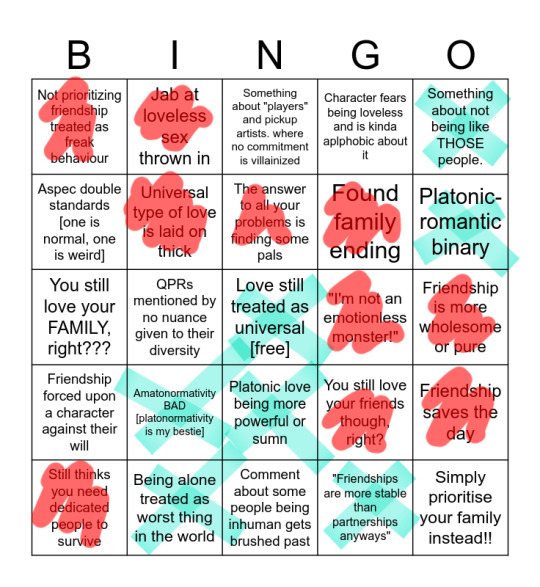
[Image ID: A bingo card made from a basic template. It has no title, and all the text is black on a white background. Some squares are marked with a blue X, while others are marked with a red scribble. The marked squares are: “Not prioritizing friendship treated as freak behaviour”, “Jab at loveless sex thrown in”, “Something about not being like THOSE people”, “Universal type of love is laid on thick”, “The answer to all your problems is finding some pals”, “Found family ending”, “Platonic-romantic binary”, “Love still treated as universal [free]”, “Friendship is more wholesome or pure”, “Amatonormativity BAD [platonormativity is my bestie]”, “Platonic love being more powerful or sumn”, “You still love your friends though, right?”, “Friendship saves the day”, “Still thinks you need dedicated people to survive”, “Being alone treated as worst thing in the world”, and “Friendships are more stable than partnerships anyways”. The unmarked, blank squares are: “Something about "players" and pickup artists where no commitment is villainized”, “Character fears being loveless and is kinda aplphobic about it”, “Aspec double standards [one is normal, one is weird]”, “You still love your FAMILY, right???”, “QPRs mentioned by no nuance given to their diversity”, “Friendship forced upon a character against their will”, “Comment about some people being inhuman gets brushed past”, and “Simply prioritise your family instead!!” /End ID]
Would I recommend this book? Uh. No! Well. Yes, but not as a good book for aspecs. I’d recommend it solely to read it yourself and form your own opinions. But, no, I would not recommend it to any aspecs I know, especially not loveless ones, aplatonic ones, aroallos, or if they're an aroace looking for support.
Ah, Loveless, how you vexx me. Never again. See you in the next, much shorter post.
#loveless aromantic#loveless aro#loveless#aplatonic#aplaro#aplatonic aro#loveless aplatonic#loveless apl#loveless alice oseman#alice oseman#osemanverse#aromantic#apl aro#arospec#aplspec#aroace#aroallo#aro#apl#aspec#scowl corner
250 notes
·
View notes
Text

Whenever I see aphobia this is all I can think about. If you think loveless people are "psychotic" or "narcissistic" or "broken" I know how you actually feel about disordered/disabled people. Just telling on yourself with this one chief.
4K notes
·
View notes
Text
btw shoutout to those who feel they are aspec because of their autism. To the aros, aces, apls, afams, and everyone else who feels their orientation is a direct result of their neurodivergency. Your feelings are valid, and you're not "just reinforcing stereotypes" by being yourself, bc you're not a character in a story, but a real person with real, lived experiences. I see you and I feel you
#saw some youtube comment be like 'autism and asexuality#are (always) separate things' and like#don't get me wrong i get where the sentiment is coming from#and i do agree that you shouldn't assume someone's aspec#just bc they're autistic (or neurodivergent)#but sometimes the two ARE tied together so inseparably#that it's odd to say they are separate things#at least. on an individual level. everyone's experiences are different ofc#neurodivergent#actually neurodivergent#autistic#autism#actually autistic#asexual#aromantic#aplatonic#afamilial#loveless#aspec#ace#aro
2K notes
·
View notes
Text
people who deserve more respect and recognition:
intersex people
trans men
aromantic people
multigender people
people in qpr's
aplatonic people
#queer#lgbtq#lgbtqia#inclusivity#equality#intersex#trans men#ftm#aromantic#aro#arospec#multigender#qpr#aplatonic#apl#aplspec
2K notes
·
View notes